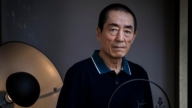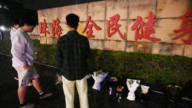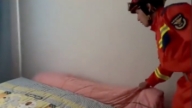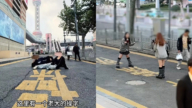【新唐人2011年11月8日讯】近年来,中国大陆的财政收入增长快速,今年将超过10万亿元。但最近中共党报号称:减税一直是主基调,增税有限。这一说法遭到网民的炮轰。
根据财政部的数据:今年(2011年)前三季度全国财政收入8万多亿元,比去年同期增长29.5%,今年财政收入将超过10万亿元,远高于GDP的增长速度。
各界普遍关注,为何财政收入如此快速增长?大陆的税负到底重不重?
对此,中共中央机关报《人民日报》发表文章,转述财政部税政司的观点说,今年财政收入增长较快,是因为经济增长、物价上涨等因素。文章宣称,近年来的税收政策,“减税”一直是主基调,增税比较有限。
而最近发生在浙江湖州织里镇的群体抗税事件则明确揭示:财政部的这套说辞很难让人相信。
织里镇拥有1.3万家童装经营者,曾被命名为“中国童装名镇”。 2008年,当地政府开始征收“机头税”,也就是按照作坊中缝纫机的数量来征税。起初,一台缝纫机每年的税款为80元,2009年翻倍成160元,2010年343元,今年(2011年)则涨到626元。同时,个体户的营业税也由7000元上涨到今年的1万多元。
10月26号下午,织里镇税务人员在征税过程中与业主发生争执,当事业主被打伤,愤怒的人群一度聚集数千人,过程中有警车被烧毁和人员受伤。
纽约市立大学经济学教授陈志飞对《新唐人》表示,大陆的高财政收入和税收增长有直接关系,“机头税”事件说明,乱征税现象非常普遍,民众非常反感。他分析指出,机头税并不是国际公认税种,属于政府的附加税。
陈志飞:“附加税应该是加到对社会公益有害的部门,比如:色情、香烟、赌博这种场所,这样使公民参与的可能性减少。但是,它(织里镇)是给当地占90%以上收入的产业——纺织业,增加这种机头税,这完全是政府滥用职权,盘剥当地民众的一个税收。”
《人民日报》这篇文章引来网民一片哗然。网友驳斥:一通歪理,不高为什么我们感觉负担重?也有网民感叹:名义上税收越减,实际缴纳的越多!
早些时候,媒体曾报导,美国《福布斯》杂志2009年推出的一份全球“税负痛苦指数”排行榜显示,中国大陆的“税负痛苦指数”位居全球第二。
对此,陈志飞教授指出,中国作为一个发展中国家,赋税水平已经和发达国家一样,这是不合理的。
陈志飞教授:“中国基本上可能要达到4成,收入的四成是来自于税收,一般的发展中国家,是百分之15到20。从这一点来看呢,中国的赋税水平跟它的发展水平是不相配的,因为它是一个新兴发展国家,它的赋税水平应该更低一些。”
《人民日报》也曾撰文反驳《福布斯》的这一评比结果。 《福布斯》回应表示,《福布斯》不但考虑了表面的数据,还考虑了各国税收是如何使用的。
陈志飞教授强调,西方国家,税收都是“取之于民、用之于民”,税收只是财产的再分配过程,这笔钱不会被政府或官员侵吞。
陈志飞教授:“在中国,没有社会福利安全网,税收在其中并没有扮演任何角色,没有像西方国家那样:取之于民、用之于民。而是被中国(中共)政府用来扩大军队、进行它日常的党务运作活动、是政府和这个独裁专制政权主要的收入来源。”
网友也评论说:平心而论,我们在乎的不是税收来源,而是强烈关注税收的去向。如果我们的高投入,得不到相应的服务,而是用来养肥一批又一批贪官,能不关切吗? !
新唐人记者周玉林、李谦、萧宇采访报导。
CCP Claims Tax-Cuts, But Raises Tax Rates
In recent years, China’s fiscal revenue has been rapidly growing.
The figure this year will exceed RMB10 trillion (US$1.57 trillion).
The official newspaper of the Chinese Communist Party (CCP)
claimed that tax-cuts have been the main reason for the growth noting that tax increases were negligible.
The CCP’s remarks were denounced by netizens.
Professionals said that heavy tax burdens are a reality in China.
The majority of the taxes the CCP collects are used
to further the CCP’s own agendas,
unlike how things are done in Western countries:
“what’s taken from the people is used for the people.”
The CCP’s Finance Ministry data shows that
fiscal revenue for the first three quarters of this year is
over RMB 8 trillion (US$1.26 trillion), an increase year-on-year
of 29.5%.
Total revenue in 201l is expected to exceed RMB 10 trillion,
(US$1.57 trillion), much higher than the gross domestic product growth rate.
The news definitely drew the public’s attention.
Why did the CCP’s fiscal revenue experience such rapid growth?
Are Chinese civilians’ tax burden heavy or are they light?
The CCP official newspaper, People’s Daily, responded
with a quote from the Taxation Department of the Finance Ministry,
saying that the rapid growth in revenue this year is
due to economic growth, raises of prices and other factors.
The article claimed that in recent years, “tax cuts"
were the main focus of the CCP’s tax policies, with very minimal tax increases.
A massive tax resistance protest recently broke out
in Zhili Town, Zhejiang Province,
clearly revealing that the CCP’s Ministry of Finance’s
statement is far from convincing.
Zhili Town, which has 13,000 manufacturers,
has been named, “China’s Renown Town for Children Clothing."
In 2008, local authorities began to levy a “machine head tax"
on companies, based on the number of sewing machines in a given workshop.
The tax rate started at RMB 80 (US$12.6) in 2008
then doubled to RMB 160 (US$25.2) in 2009.
In 2010, the rate was RMB 343 (US$54),
and this year, tax payments rose to RMB 626 (US$99), per head.
Meanwhile, self-employed business taxes also rose
from RMB 7,000 (US$1,100) to RMB 10,000 (US$1,570), this year.
On October 26, the tax officials of Zhili Town
had a dispute with a business owner.
The business owner was beaten and injured.
Thousands of angry people gathered to protest.
During the protest, police cars were burned and
someone was injured.
Chen Zhifei, a professor in economics at
The City University of New York, said to NTD TV that
China’s high fiscal revenue has a direct link to
the tax hikes recently.
The “machine head tax" incident showed that
the practice of randomly levying taxes is a commonplace in China, which is very offensive for Chinese citizens.
Professor Chen analyzed the “machine head tax" and said
it is not an internationally recognized tax, rather, it is classified as a surtax levied by local authorities.
Chen Zhifei: “Surtaxes should be imposed on those sectors
of society that damage or harm social welfare, such as pornography, cigarettes, gambling, and the like.
This will help deter citizens from engaging in these activities.
But the authorities of Zhili Town levied a surtax
on the local pillar industry, the textile industry, which accounts for over 90% of local revenue.
By initiating this tax, local authorities misused their power
to exploit the local population.”
The People’s Daily’s article incited an uproar among netizens.
One netizen responded: “A bunch of pettifoggers.
If you say our tax burden is not too high,
than why do we feel it is such a heavy burden?
Another netizen sighed: “The more nominal the tax-cut,
the more tax payments we actually pay! ”
Back to earlier reports, the U.S. magazine, Forbes, released
a global Tax Misery Index in 2009. China ranked second.
Professor Chen pointed out that as a developing country,
China’s taxation level has matched that of developed countries, which is unreasonable.
Professor Chen Zhifei: “Basically, it is expected that
40% of China’s fiscal revenue comes from taxes.
In general, the figure of a developing country is 15%-20%.
That is to say, China’s taxation does not match its level of development.
As an emerging country,
its level of taxation should be lower."
People’s Daily refuted Forbes’ index ranking.
Forbes responded by saying that the index not only
took into account raw fiscal data, but also considered the domestic taxes of each country.
Chen Zhifei stressed that Western countries’ tax levy
follows, “what’s taken from the people is used for the people.”
Tax collection amounts to property redistribution,
thus these funds cannot be embezzled by the government or officials.
Professor Chen Zhifei: “In China, no social welfare system
has been established, so taxes do not contribute to that end.
There’s no practice in China similar to Western countries’
a practice that “what’s taken from the people is used for the people.”
Instead, taxes was used by the CCP regime
to expand its military and to carry out routine Party activities.
Taxes become the main source of revenue
for the CCP regime.”
A netizen commented: “To be honest, what we care about
is not who collects the taxes, but where the taxes are going.
If our taxes do not enhance society with new and
better services,
but instead enrich a bunch of corrupt officials,
how could we not show our concern?!”
NTD reporters Zhou Yulin, Li Qian and Xiao Yu





























